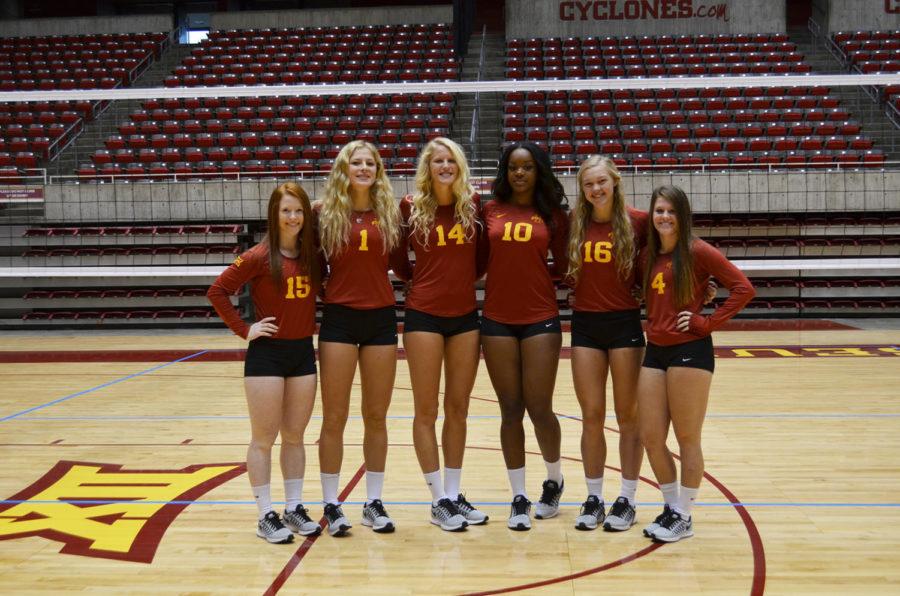Experimental challenge replay hits Big 12 volleyball
Katy Klopfenstein/Iowa State Dai
The ISU volleyball 2015 recruiting class at Hilton Coliseum(Left to right) Hali Hillegas, libero/defensive specialist; Hannah Bailey, right-side hitter; Jess Schaben, outside hitter; Grace Lazard, middle blocker; and Remi Bowman, setter.
October 15, 2015
The crowd and players at the ISU home volleyball game against Kansas State on Oct. 7 sat in silence for three minutes while the referees looked at a challenged replay.
The time-consuming challenge characterizes the slow progression of the first year of experimental challenges in Big 12 volleyball.
The NCAA started incorporating challenge replays in the Big 12, Big 10 and Pac-10 conferences to see if was an effective tool. The start of the experiments has been slow and difficult, but the future is bright, involving more conferences with a few changes in the offseason.
“I think we’re off to a good start, and replays are getting faster,” said ISU volleyball coach Christy Johnson-Lynch. “I think we do need to tweak it, but in the end, it’s supposed to get the call right and it’s a nice tool to have for the matches.”
Iowa State has only played in six matches in which the challenge system was enacted. Throughout those six matches, Iowa State has challenged only two calls, and both were upheld.
The experimental challenge replay was agreed upon by all of the Big 12 coaches, who thought it would be a great way to fix some of the close calls.
The Big 12 was one of three conferences chosen for the system because of its accessibility to the technology that is needed.
Basketball uses the same type of technology for its instant replays, so the Big 12 Conference had a simple transition. The hope for this challenge system is to make it effective in overturning calls, and most importantly, get the right call made.
“I think the system is effective, and it’s nice to be reassured on a close call that referees might not see,” said setter Monique Harris. “At other points in the match, it tends to slow the game down, so that kind of sucks.”
Outside hitter Ciara Capezio, Harris and Johnson-Lynch agree that the challenge system does slow the game down. As of now, Johnson-Lynch thinks some coaches use a challenge like a timeout because of the lack of consequences.
Johnson-Lynch said there needs to be a punishment, like losing a timeout, if the team loses the challenge. Otherwise, the team has three timeouts and an additional three potential breaks in play from three challenges.
Another issue of the challenge system is the potential for technology and camera angle problems.
Johnson-Lynch noticed the problem with camera angles during two road matches against Oklahoma and Texas last week.
Iowa State challenged a play that a ball hit the antenna, but the gym didn’t have a camera angle to reverse the call. Johnson-Lynch has learned from her mistakes and will use the challenges when she knows there will be an angle.
In the future, Big 12 volleyball coaches will meet with conference staff and re-evaluate the challenge system. At that time, they will make corrections for the 2016-17 volleyball season, so they can eliminate incorrect calls.
“The goal for this challenge replay system is to make it a universal tool for every college volleyball team in the country,” said Laura Rasmussen, the Big 12 conference communications contact for volleyball. “In the end, we want each call to be correct so the right team wins each match fairly.”
















